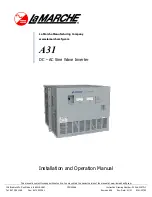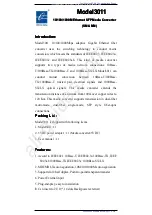
Quick Installation Guide
Evershine TLC4000/5000/6000/8000/10000
532-08110-02
1.
Evershine is a transformerless photovoltaic (PV) inverter with two MPP trackers which converts the direct
current from PV array into grid-compliant alternating current, and feeds it into the utility grid.
2.
Evershine must only be operated by qualified persons with the appropriate skills who have already read
all documentation relating to its installation, commissioning, operation and maintenance.
3.
Evershine is suitable for indoor and outdoor use.
4.
Evershine must only be operated with PV arrays of protection class II in accordance with IEC 61730,
application class A. Do not connect any sources of energy other than PV arrays to the inverter.
5.
PV modules with a high capacity to ground must only be used if their coupling capacity does not exceed 1.0
μ
F.
6.
When exposed to sunlight, the PV array generates dangerous DC voltage, touching the DC conductors or the
live components can lead to lethal electric shocks.
7.
All components must remain within their permitted operating ranges at all times.
8.
Evershine complies with the Low Voltage Directive 2014/35/EU and the EMC Directive2014/30/EU.
Evershine also complies with the requirements for safety and EMC in Australia and New Zealand markets.
Evershine labels with the CE mark and RCM mark. For more information about certificates in other countries
and regions, please visit website (www.zeversolar.com).
Icon
Explanation
Icon
Explanation
Danger
Time need to discharge stored
energy
Danger to life due to electric shock
WEEE designation
Risk of burns due to hot surfaces
Observe the documentation
- Mount the inverter in areas where it cannot be touched inadvertently.
- Ensure good access to the inverter for installation and possible service.
- Ambient temperature should be
≤
40°C to ensure optimal operation.
- Ensure optimum operation and extend service life by avoiding exposing
the inverter to direct sunlight, rain and snow.
- The mounting method, location and surface must be suitable for the
inverter's weight and dimensions.
- If mounted in a residential area, we recommend mounting the inverter
on a solid surface, plasterboard and similar materials are not
recommended due to audible vibrations when in use.
- Mount the inverter vertically or tilted backward by max. 15°.
- The electrical connection area must point
downwards.
- Do not put any objects on the inverter.
- Do not cover the inverter.
- Observe the recommended clearances to walls,
other inverters, or objects as follows to ensure
sufficient heat dissipation.
Object
above
below
sides
Recommended clearance
300mm
500mm
250mm
Inverter
Wall
bracket
Mounting
accessory kit
DC plug
connector
Sealing plug
AC connection
plug
RJ45 plug
Smart meter conn-
ection Plug (optional)
WiFi antenna
(optional)
Documentation
1
×
1
×
1
×
2
(1)
/3
×
2
×
1
×
1
(2)
/2
×
1
×
1
×
1
×
(1).2 pairs for Evershine TLC4000
~
TLC6000. (2).1 pcs for the inverter integrated with Ethernet module.
1.
Use a
Φ
10mm bit to drill 4 holes at a depth of about 70mm, insert the wall anchors and attach the wall
bracket to the wall.
2.
Hang the inverter onto the wall bracket slightly downwards.
3.
Attach the outer fins of heat sink to both sides of the wall bracket using M5 screws(T25 screwdriver,
torque: 2.5Nm), as shown in Figure A. If additional grounding or equipotential bonding is required, ground
the inverter as shown in Figure B.
1.
AC cable requirements as follows:
Object
Description
Value
A External diameter
12…21 mm
B Copper conductor cross-section
2.5…6 mm²
C Stripping length of the insulated conductors
approx. 9 mm
D Stripping length of the outer sheath of the AC cable approx. 75 mm
The PE insulated conductor must be 5 mm longer than the L and N conductors.
2.
Insert the conductor into the suitable ferrule acc. to DIN 46228-4 and crimp the contact.
Plastic fixture Socket element Adapter Seal ring Fastening case Swivel nut
3.
Guide the swivel nut, the fastening case with sealing ring and the adapter over the AC cable.
4.
Insert the crimped conductors PE, N, L1, L2, and L3 into the corresponding terminals and tighten the screw
with torque 2.0Nm using an Allen key (AF 2.5). Assignment is according to the label on the socket element.
5.Assemble the socket element, adapter and swivel nut together.
Match the plastic fixture with the socket element and grip them, then screw the adapter and swivel nut.
6.Insert the AC connection plug into the receptacle on the inverter, then screw the socket element until it
snaps into place.
1.
DC cable requirements as follows:
2.
Lead the stripped cable all the way into the DC plug connector.
Press the clamping bracket down until it audibly snaps into place.
Push the swivel nut up to the thread and tighten(SW15, torque: 2.0Nm).
Connect the assembled DC plug connectors to the inverter.
3.
For unused DC plug connectors, push down the clamping bracket and push the swivel nut up to the thread.
Insert the sealing plug into the DC plug connector. Tighten the DC plug connector (SW15, torque: 2.0Nm).
Finally insert the DC plug connectors with sealing plugs into the corresponding DC inputs on the inverter.
Danger to life due to high voltages of the PV array
When exposed to sunlight, the PV array generates dangerous DC voltage which is present in the DC conductors and the live
components of the inverter. Touching the DC conductors or the live components can lead to lethal electric shocks. If you disconnect
the DC connectors from the inverter under load, an electric arc may occur leading to electric shock and burns.
•Do not disconnect the DC connectors under load.
•Do not touch non-insulated cable ends.
•Do not touch the DC conductors.
•Do not touch any live components of the inverter.
•Have the inverter mounted, installed and commissioned only by qualified persons with the appropriate skills.
•If an error occurs, have it rectified by qualified persons only.
•Prior to performing any work on the inverter, disconnect it from all voltage sources.
Danger to life due to high voltages in the inverter
Before performing the electrical connection, ensure the DC switch & AC circuit breaker are switched off and cannot be reactivated.
www.zeversolar.com
1
2
3
1
图
A
图
B




















